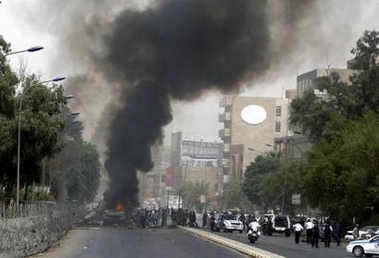New British envoy: Iraq not in civil war
(Reuters)
Updated: 2006-08-28 09:31
BAGHDAD - Britain's new ambassador to Baghdad said on Sunday that Iraq was
not in the civil war that his predecessor warned was a strong possibility.

Smoke rises shortly
after a bomb exploded inside a minibus in Baghdad August 27, 2006. A spate
of car bombings and shootings across Iraq killed at least 55 people on
Sunday, but Prime Minister Nuri al-Maliki said violence was on the
decrease and that the country would never slide into a civil war.
[Reuters] |
But Dominic Asquith also said that the Iraqi government must consolidate
recent progress in curbing violence in Baghdad and on reconciling rival
sectarian and ethnic communities.
"The risk of a descent into civil war is clearly on many people's minds," he
told a news conference.
"We are concerned about the extent of sectarian violence and that risk should
concentrate the minds of political leaders."
But he said, "I don't think we're in a civil war." He argued that the Iraqi
government and security forces were functioning.
"If we can consolidate the progress ... I feel optimistic," Asquith said.
Pressed to forecast what would happen if the government failed, he said: "Let's
hope we make the progress."
His predecessor in Baghdad, William Patey, confessed to being pessimistic
about the immediate future of Iraq and, in a leaked diplomatic cable published
by the BBC this month spoke of a low-level civil war developing.
"The prospect of a low-intensity civil war and a de facto division of Iraq is
probably more likely at this stage than a successful and substantial transition
to a stable democracy," Patey wrote to Prime Minister Tony Blair, who has
invested much of his personal political capital in the occupation of Iraq.
Patey also said he had hopes that Iraq could flourish.
|